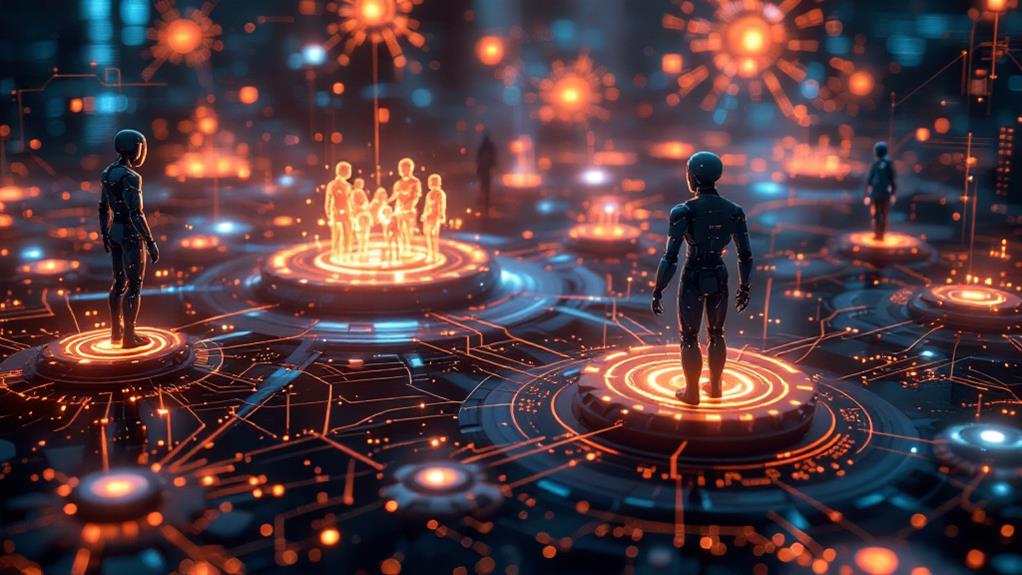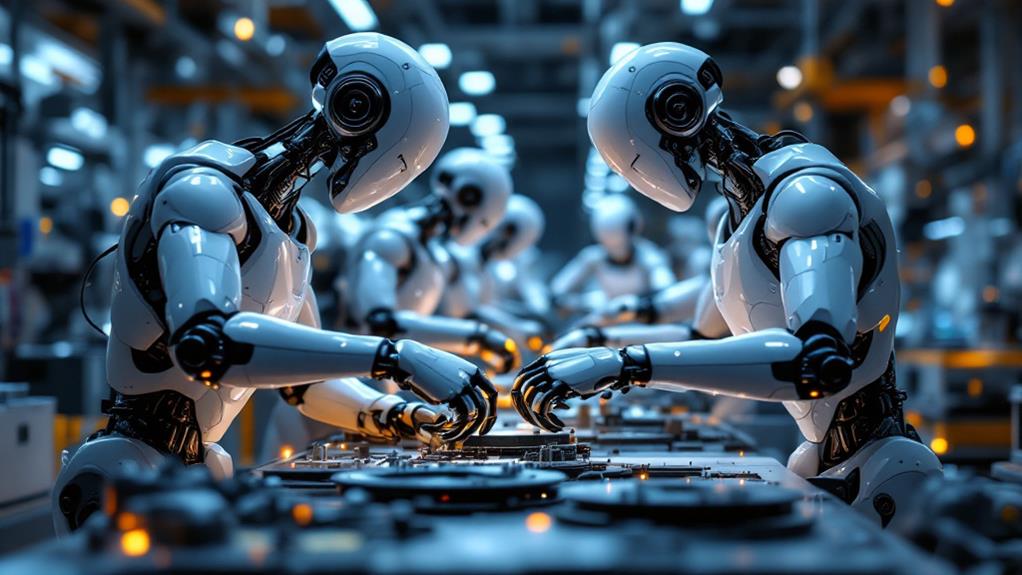Are You Prepared for the AI and Robotic Revolution? What You Need to Know
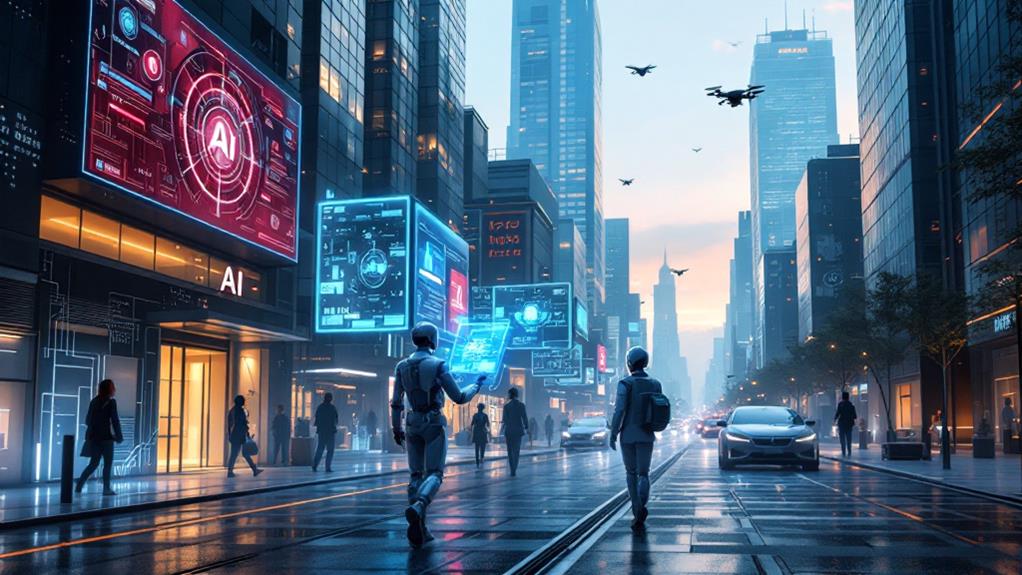
The AI and robotic revolution is reshaping our world, impacting everything from daily life to the job market. You'll need to adjust quickly to stay competitive. Focus on developing skills that complement AI, such as critical thinking, creativity, and emotional intelligence. Stay informed about industry trends and pursue continuous learning opportunities. Be aware of ethical considerations, including privacy concerns and algorithmic bias. Prepare for economic shifts by upskilling and exploring new career paths. Engage with digital literacy and understand AI systems to thrive in this evolving terrain. The future holds both challenges and opportunities – are you ready to traverse this transformative era?
The Current State of AI
Three key areas define the current state of AI: machine learning, natural language processing, and computer vision. Machine learning advancements have revolutionized the way AI systems learn and adapt, allowing them to improve their performance without explicit programming. You'll find machine learning applications in various fields, from recommendation systems to autonomous vehicles.
Natural language processing has made pivotal strides, enabling AI to understand and generate human language more accurately. This technology powers virtual assistants, chatbots, and language translation services, making communication between humans and machines more seamless than ever before.
Computer vision has evolved to recognize and interpret visual information with incredible precision. It's now used in facial recognition systems, medical imaging analysis, and autonomous vehicles, enhancing safety and efficiency across industries.
As AI continues to advance, you'll see its impact in your daily life. From personalized recommendations on streaming platforms to AI-powered health diagnostics, these technologies are becoming increasingly integrated into society. To stay ahead, it's imperative to understand these developments and their potential implications for your personal and professional life.
Robotics in Everyday Life
While AI continues to reshape our digital interactions, robotics is altering our physical world. You're likely already encountering robots in your daily life, often without realizing it. From automated checkout systems at grocery stores to robotic vacuum cleaners in your home, these machines are becoming increasingly prevalent.
Home automation is a prime example of robotics entering everyday life. Smart thermostats, security systems, and voice-activated assistants are making your living spaces more efficient and responsive. You can now control lighting, temperature, and even appliances with a simple voice command or smartphone app.
In transportation, robotics is driving significant advancements. Self-driving cars are being tested on public roads, while delivery robots are starting to appear in some cities. You might soon find yourself sharing the sidewalk with these autonomous machines as they deliver packages or food orders.
Robotics is also modifying healthcare, manufacturing, and agriculture. You may encounter robotic surgical assistants during medical procedures or benefit from precision farming techniques that use autonomous tractors and drones. As robotics continues to evolve, you'll find these machines playing an increasingly important role in various aspects of your daily life.
Job Market Transformation
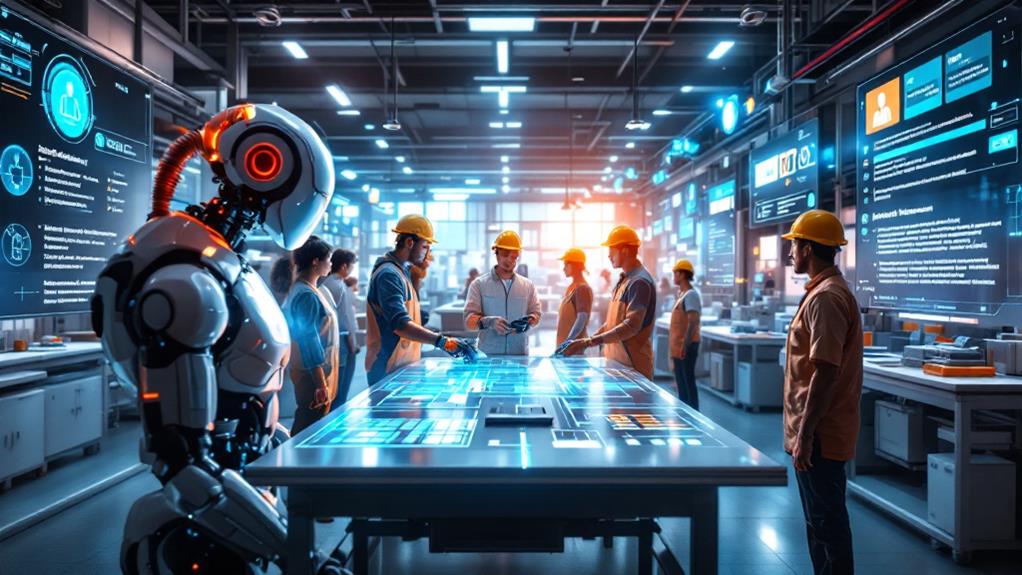
The advent of AI and robotics is reshaping the job market at an unparalleled pace. You're likely to witness significant changes in your career trajectory as automation takes over routine tasks. It's essential to stay ahead of the curve by embracing worker reskilling and adapting to new technologies.
In this era of job uncertainty, you'll need to focus on developing skills that complement AI and robotics rather than compete with them. Critical thinking, creativity, and emotional intelligence are becoming increasingly precious as machines handle data-driven tasks. You should also consider upskilling in areas like AI programming, data analysis, and robotics maintenance to remain relevant.
The gig economy is expanding, offering you more flexible work options but also requiring adaptability and self-motivation. You'll need to be prepared for frequent career transitions and continuous learning. While some jobs will disappear, new roles will emerge in fields like AI ethics, human-machine interaction, and advanced manufacturing. By staying informed about industry trends and actively pursuing professional development, you can position yourself to thrive in this evolving job market.
Ethical Considerations
Ethical dilemmas surrounding AI and robotics are becoming increasingly complex as these technologies advance. You'll need to grapple with privacy concerns as AI systems collect and analyze vast amounts of personal data. Consider how your information might be used and who has access to it. It's pivotal to stay informed about data protection laws and advocate for stronger safeguards.
Algorithmic bias is another pressing issue you should be aware of. AI systems can perpetuate and amplify existing societal biases, leading to unfair outcomes in areas like hiring, lending, and criminal justice. You must critically examine the algorithms that impact your life and push for transparency and accountability in their development and deployment.
As AI becomes more autonomous, you'll face questions about responsibility and liability. Who's accountable when an AI system makes a mistake or causes harm? You'll need to engage in discussions about the ethical models governing AI decision-making and the boundaries of machine autonomy.
Additionally, consider the broader societal impacts of AI and robotics. How will these technologies affect human relationships, creativity, and the nature of work? By staying informed and actively participating in ethical debates, you can help shape a future where AI and robotics benefit humanity while minimizing potential harms.
Economic Impact
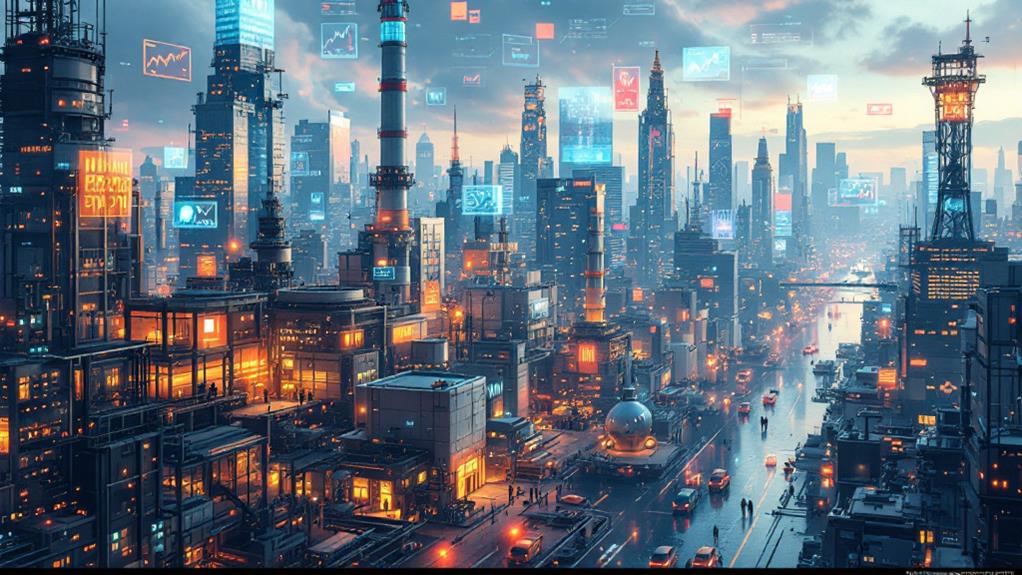
Altering economies worldwide, AI and robotics are reshaping industries and labor markets at an unparalleled pace. You'll witness a significant shift in job roles, with automation replacing routine tasks and creating new opportunities in tech-related fields. This transformation will likely exacerbate income inequality and impact wealth distribution, as high-skilled workers benefit while others struggle to adapt.
You'll need to prepare for these changes by:
- Upskilling to remain competitive in the job market
- Embracing lifelong learning to stay relevant
- Developing soft skills that complement AI capabilities
- Exploring entrepreneurial opportunities in emerging sectors
- Advocating for policies that address economic disparities
As AI and robotics continue to evolve, you'll see increased productivity and economic growth. However, you'll also face challenges in ensuring equitable distribution of these gains. You'll need to contemplate the potential for job displacement and the need for retraining programs. By staying informed and adaptable, you can position yourself to thrive in this new economic environment, where AI and robotics play an increasingly significant role in shaping our future.
Education and Skill Development
Education systems worldwide are undergoing a radical metamorphosis to keep pace with the AI and robotic revolution. You'll need to adapt quickly to stay relevant in this rapidly evolving terrain. Embracing lifelong learning is no longer optional; it's a necessity to remain competitive in the job market.
To prepare for the AI-driven future, you must prioritize digital literacy. This means more than just knowing how to use a computer or smartphone. You'll need to understand data analysis, coding basics, and how AI systems function. Many online platforms offer courses in these areas, allowing you to upskill at your own pace.
Significant skills will become even more essential as routine tasks are automated. You should focus on developing abilities that complement AI, rather than compete with it. This includes emotional intelligence, complex problem-solving, and interdisciplinary thinking.
Schools and universities are revamping their curricula to include AI and robotics education. If you're a student or parent, look for programs that offer hands-on experience with these technologies. For professionals, consider pursuing certifications or advanced degrees in AI-related fields to future-proof your career.
AI in Healthcare
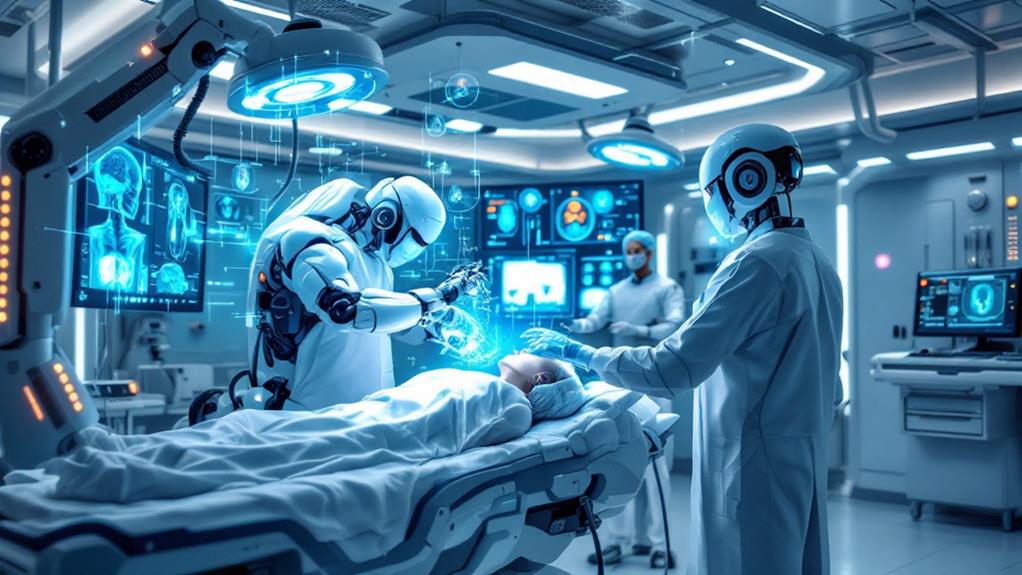
As healthcare systems worldwide grapple with increasing demands and complexities, AI is emerging as a powerful tool to revolutionize patient care and medical research. You'll witness AI-driven technologies transforming various aspects of healthcare, from patient diagnosis to treatment optimization. These innovations promise to enhance accuracy, efficiency, and personalization in medical practices.
AI's impact on healthcare is multifaceted, offering benefits such as:
- Analyzing complex medical images to detect anomalies
- Predicting patient outcomes based on vast datasets
- Customizing treatment plans for individual patients
- Automating administrative tasks to free up healthcare professionals
- Monitoring patients remotely through wearable devices
You'll see AI algorithms assisting doctors in making more accurate diagnoses by analyzing symptoms, medical history, and test results. This technology can identify patterns and correlations that might be overlooked by human practitioners. In treatment optimization, AI can help determine the most effective therapies for specific conditions, considering factors like genetic makeup and lifestyle. As AI continues to advance, you can expect more precise, efficient, and personalized healthcare experiences. However, it's essential to remain aware of potential challenges, such as data privacy concerns and the need for human oversight in AI-driven decisions.
Future Predictions and Challenges
The rapid advancement of AI and robotics will reshape our world in ways we're only beginning to imagine. Technology forecasting suggests that AI will become increasingly integrated into every aspect of our lives, from autonomous vehicles to personalized medicine. You'll likely interact with AI-powered systems daily, often without realizing it.
As these technologies evolve, you'll face both exciting opportunities and significant challenges. AI may expedite productivity and solve complex problems, but it could also lead to job displacement and income inequality. You'll need to adapt to a changing job market by developing skills that complement AI rather than compete with it.
Societal disruption is inevitable as AI and robotics transform industries and social structures. You'll grapple with ethical dilemmas surrounding privacy, decision-making algorithms, and the potential for AI to surpass human intelligence. Preparing for this future means staying informed about technological developments and their implications.
To thrive in the AI-driven world, you'll need to welcome lifelong learning, cultivate creativity, and develop strong interpersonal skills. By understanding the potential impacts of AI and robotics, you can position yourself to traverse the challenges and seize the opportunities of this revolutionary era.
